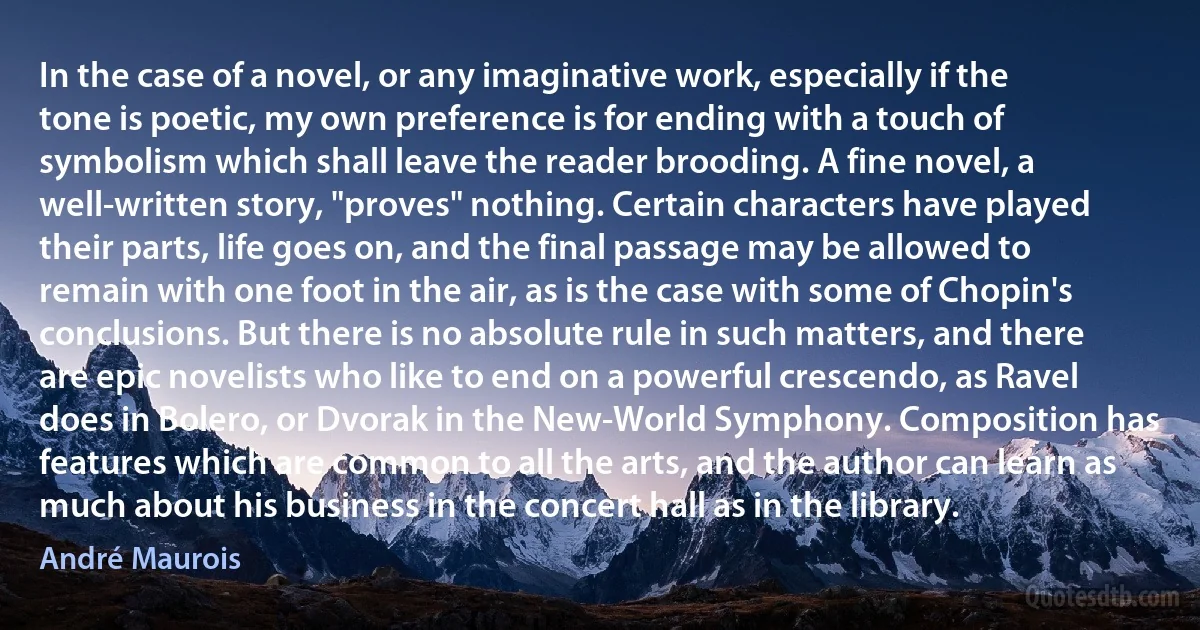
In the case of a novel, or any imaginative work, especially if the tone is poetic, my own preference is for ending with a touch of symbolism which shall leave the reader brooding. A fine novel, a well-written story, "proves" nothing. Certain characters have played their parts, life goes on, and the final passage may be allowed to remain with one foot in the air, as is the case with some of Chopin's conclusions. But there is no absolute rule in such matters, and there are epic novelists who like to end on a powerful crescendo, as Ravel does in Bolero, or Dvorak in the New-World Symphony. Composition has features which are common to all the arts, and the author can learn as much about his business in the concert hall as in the library.
André MauroisRelated topics
air business case certain common composition crescendo end ending epic final fine foot hall learn leave life nothing novel passage ravel remain rule story symbolism symphony touch work partsRelated quotes
Centuries ago, sailors on long voyages used to leave a pair of pigs on every deserted island. Or they'd leave a pair of goats. Either way, on any future visit, the island would be a source of meat. These islands, they were pristine. These were home to breeds of birds with no natural predators. Breeds of birds that lived nowhere else on earth. The plants there, without enemies they evolved without thorns or poisons. Without predators and enemies, these islands, they were paradise. The sailors, the next time they visited these islands, the only things still there would be herds of goats or pigs. .... Does this remind you of anything Maybe the ol' Adam and Eve story .... You ever wonder when God's coming back with a lot of barbecue sauce.

Chuck Palahniuk
To the biologist the problem of socialism appears largely as a problem of size. The extreme socialists desire to run every nation as a single business concern. I do not suppose that Henry Ford would find much difficulty in running Andorra or Luxembourg on a socialistic basis. He has already more men on his pay-roll than their population. It is conceivable that a syndicate of Fords, if we could find them, would make Belgium Ltd. or Denmark Inc. pay their way. But while nationalization of certain industries is an obvious possibility in the largest of states, I find it no easier to picture a completely socialized British Empire or United States than an elephant turning somersaults or a hippopotamus jumping a hedge.

J. B. S. Haldane
People who originally have no means but are ultimately able to earn a great deal, through whatever talents they may possess, almost always come to think that these are permanent capital and that what they gain through them is interest. Accordingly, they do not put aside part of their earnings to form a permanent capital, but spend their money as fast as they earn it. But they are then often reduced to poverty because their earnings decrease or come to an end after their talent, which was of a transitory nature, is exhausted, as happens, for example, in the case of almost all the fine arts; or because it could be brought to bear only under a particular set of circumstances that has ceased to exist.

Arthur Schopenhauer
What is seen and called the picture is what remains – an evidence. Even as one travels in painting towards a state of 'unfreedom' where only certain things can happen, unaccountably the unknown and free must appear. Usually I am on a work for a long stretch, until a moment arrives when the air of the arbitrary vanished and the paint falls into positions that feel destined. The very matter of painting – its pigment and space – is so resistant to the will, so disinclined to assert its plane and remain still. Painting seems like impossibility, with only a sign now and then of its own light. Which must be because of the narrow passage from a diagramming to that other state – corporeality. In this sense, to paint is a possessing rather than a picturing.

Phillip Guston
So, ungentle reader, (as you and I value what we should ashamed-after witnessing a few minor circus-marvels-to call our "lives,") let us never be fooled into taking seriously that perfectly superficial distinction which is vulgarly drawn between the circus-show and "art" or "the arts." Let us not forget that every authentic "work of art" is in and of itself alive and that, however "the arts" may differ among themselves, their common function is the expression of that supreme alive-ness which is known as "beauty." This being so, our three ring circus is art-for to contend that the spectacle in question is not an authentic manifestation of "beauty" is as childish, as to dismiss the circus on the ground that it is "childish," is idiotic.

E. E. Cummings
